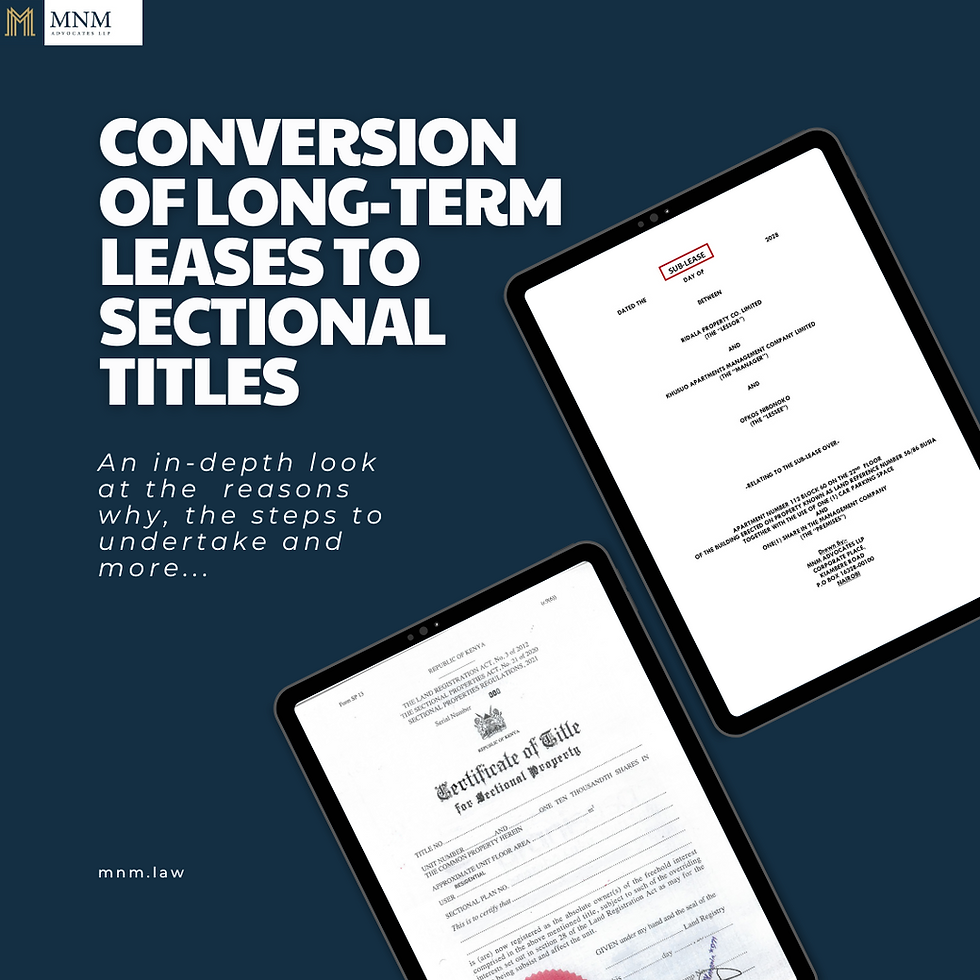The 5 things we learnt from the era of virtual AGMs
- Derek Ndonye

- Nov 28, 2022
- 5 min read
Updated: Feb 1, 2023
Extraordinary times call for extraordinary measures. This saying rings true at this particular time when the world is facing the Covid 19 pandemic which has changed the way we do things.
The restrictions on movement as well as large public gatherings have also affected the way companies do things. Annual General meetings, for instance, an important corporate governance tool, had been rendered impracticable in the current circumstances. AGMs are mandatory under the provisions of section 275A of the Companies Act as read by the respective members of a company.
At the Annual General Meeting, shareholders consider, discuss and pass resolutions on important issues such as Audited Accounts, Dividend approvals, elections and removal of directors among others.
Luckily, the technological innovations of the 21st century have equipped us with tools that were not available in decades past. Web-based Video technology apps and platforms have existed for a while now. However few companies or organizations had incorporated the use of virtual platforms into their memorandums and articles of association. It is therefore clear that while necessity is the mother of invention, the challenge posed in embracing the use of technology has been the lack of legal grounding.

With this backdrop, companies have turned to the provisions of section 280 of the Companies Act 2015 to seek leave of the court to convene general meetings virtually. The said section provides that in instances where the convening of a public meeting has become impracticable, then a company member is entitled to vote at the meeting, or a director can apply to the court for such orders. The court also has the power to issue such orders on its motion (Suo moto). WPP Scan Group Plc was the first company to obtain such leave vide HC Misc Application No E680 of 2020.
In that particular case, the court granted the company leave to conduct its AGM. More importantly, Justice Majanja invoking the provisions of section 280 (3), granted leave Suo moto to all listed companies that find it impracticable to conduct AGM’s on account of Covid-19 to proceed with the same subject to receiving a receiving a letter of No objection from the CMA. The No objection from CMA was to be received 14 days prior to issuing notice.
The court directed that companies in their applications to the CMA must set out in detail the mode, manner and means by which they intend to use virtual, electronic or hybrid technologies.
The court went on to set out the preconditions for the grant of the No objection by the CMA to wit that a company must demonstrate:
That members of the company shall be provided with notices compliant with the company memarts and the companies Act
That the members will be furnished with sufficient information to make informed decisions on any resolutions presented at the meeting.\
That members shall be accorded the sufficient opportunity to ask questions and seek clarifications that they may require from directors.
That members shall be accorded an opportunity to vote with the voting procedure being sufficiently explained to them.
Pursuant to the court’s orders as above the CMA published a circular dated 27th May 2019 setting out in detail the conditions for the grant of a No Objection approval. The CMA requirements focused on ensuring transparency, the integrity of voting processes, and equal treatment of shareholders. The guidelines also require listed companies to conduct a risk assessment with their registrar. The CMA also issued a guidance note on 22nd June 2020 regarding deferrals. Under this note, the CMA granted companies that may have been or are still unable to conduct AGMs to defer the same up to 31st December 2020.

Having looked at listed companies, the question remains as to whether non-listed companies can proceed to hold AGM’s virtually. The Director General of the Business Registration Service on his part issued guidelines on the conduct of Hybrid and virtual meetings by companies. The guidelines were issued pursuant to the provisions of section 876 of the Companies Act which empower the registrar to make rules. Under the guideline companies were given the following options:
Written Resolutions In Lieu Of General Meetings
In respect to Private companies who are unable to conduct general meetings on account of Covid-19 prevention measures, the Director General has recommended that companies embrace the use of written resolutions in lieu of general meetings. Sections 262 to 273 of the Companies Act provide the modalities for circulation and passing written resolutions by shareholder. Company’s are however restrained from passing written resolutions in respect to removal of an auditor or a director before expiry of their respective terms.
Delaying or Postponing AGM’s with the Registrar’s consent
The Director General has advised companies to explore the option of delaying or postponing their AGM’s with leave from the office of the Registrar of Companies. The decision to delay or postpone an AGM should be taken after considering the effects of such decision on the business of the company as well as the interests of shareholders.
Virtual or Hybrid meetings
The Director General has encouraged companies to leverage on technology where the memarts allow for the use of hybrid- physical in person meeting (subject to public health guidelines) together with the option to join in remotely- as well as the conduct of fully virtual meetings. It is noteworthy that public companies that have adopted the model articles empower them to conduct meetings virtually at different venues.

In further support of the recommendation for virtual meetings, the Director General issued guidelines that companies embracing virtual means must take into consideration when convening AGM’s to wit:
Appropriate technology must be in place to allow member participation
Reliable infrastructure enabling members to participate, and vote must be put in place.
Online voting systems must allow members to cat votes in a timely manner.
Members with no access to internet can appoint proxies to cast votes on their behalf
Members should be given guidance on the method and requirements for voting electronically on the chosen platform.
All protocols and rules of procedure must be circulated in advance including timelines, means of voting and raising questions.
Secure authentication systems should be in place in ensuring that a quorum is present and maintained throughout the meeting.
User accessibility, data privacy and member participation must be given consideration.
For hybrid meetings, the venue should be the registered office or such venue as selected by the directors.
From the above exposition, it is possible to hold and conduct an AGM with the assistance of technology subject to compliance with the above measures. It is imperative to note that we have already had several companies such as Safaricom, Britam and Kenya Airways that have successfully conducted virtual AGM’s. In addition, other corporate bodies such as the Law Society of Kenya have also successfully conducted AGM’s, with the LSK having done so with leave of the court. While teething problems have been experienced as is the case with any new ventures, all signs are that virtual and hybrid AGM’s are here to stay.




Comments